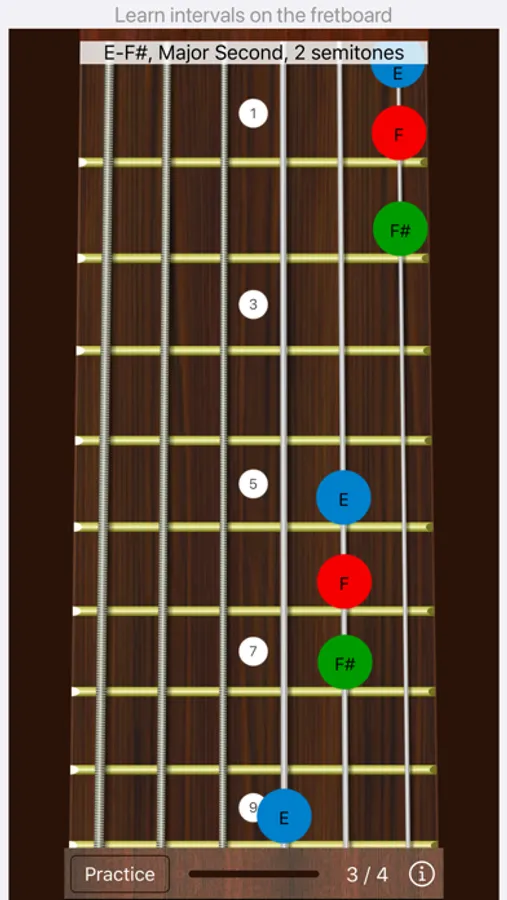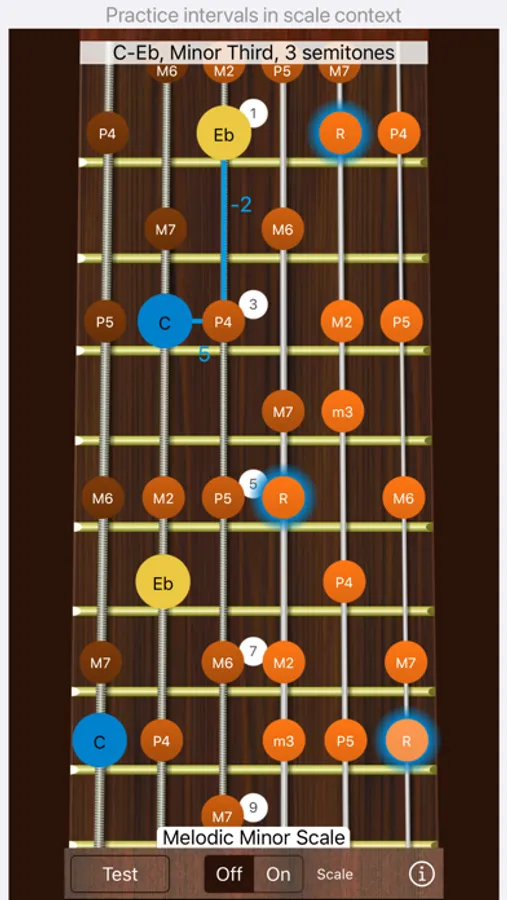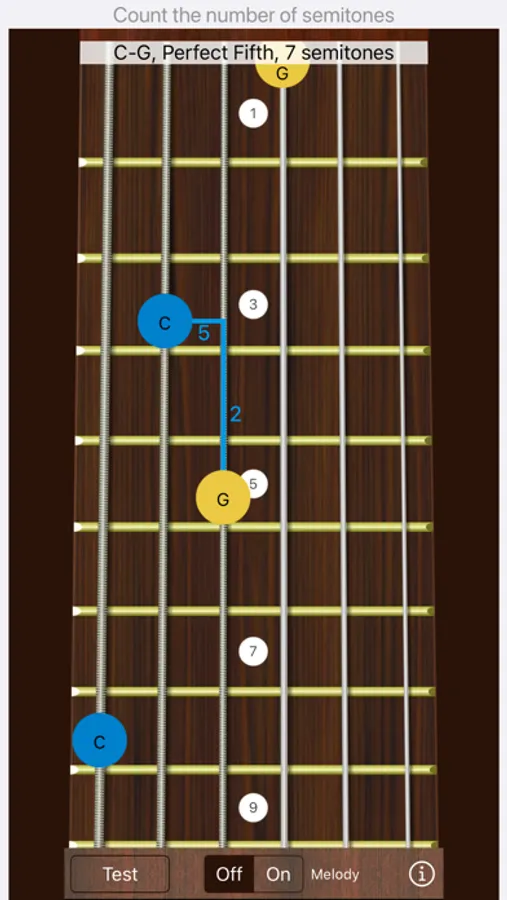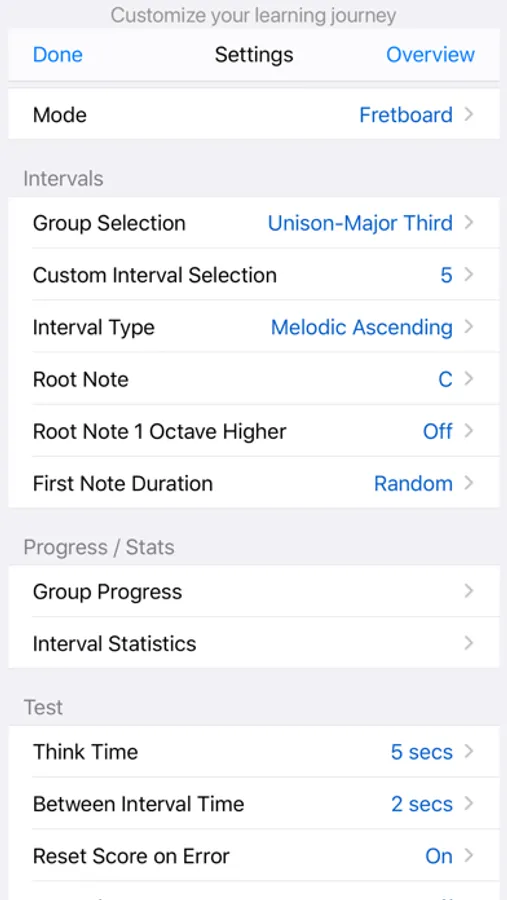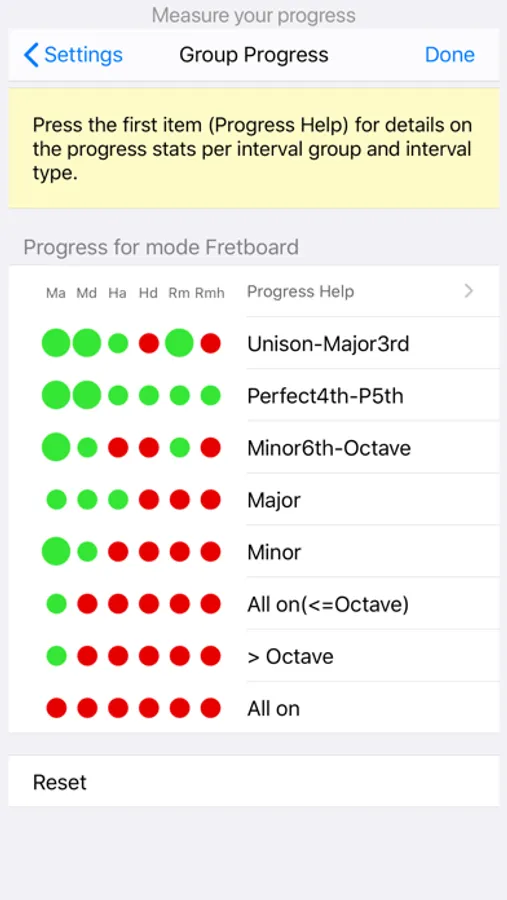AppRecs review analysis
AppRecs rating 4.6. Trustworthiness 72 out of 100. Review manipulation risk 27 out of 100. Based on a review sample analyzed.
★★★★☆
4.6
AppRecs Rating
Ratings breakdown
5 star
90%
4 star
0%
3 star
0%
2 star
10%
1 star
0%
What to know
✓
Low review manipulation risk
27% review manipulation risk
✓
Credible reviews
72% trustworthiness score from analyzed reviews
✓
High user satisfaction
90% of sampled ratings are 5 stars
About Guitar Interval Ear Trainer
One of the first steps in ear training is recognizing intervals, which are the distances between two notes. Because every melody, chord, or scale consists of a series of intervals, this is a fundamental and valuable skill in music.
Our app is designed to help you identify intervals and learn how to locate them on the guitar. By improving your knowledge of intervals on the guitar, you can easily decipher chord progressions, replicate melodies as you hear them, gain a better understanding of written music, and more.
Key Features
- Choose from 17 selectable intervals, ranging from unison and minor seconds to major tenths.
- Select between melodic and harmonic intervals, for both ascending and descending.
- Get a visual representation of intervals on the guitar.
- Choose the root note from two octaves.
- Use portrait, portrait upside down, and landscape modes.
- Optional voice function for convenient training, even in the car.
- Practice and test (quiz)modes.
- Intervals are categorized by difficulty level, with each group having 6 progress indicators corresponding to different interval types (melodic ascending/descending, harmonic ascending/descending, random melodic, random harmonic/melodic).
- Optional reference melodies for each interval can be played, helping you learn intervals faster.
- When practicing harmonic intervals, the app classifies the interval as consonant or dissonant, helping you identify harmonic intervals effectively.
- Access over 10 alternate tunings, including NST (new standard tuning) and all fourths tuning, making it easier to recognize similar patterns across the fretboard for the same intervals.
- An option to play only tapped notes (interval type "None") is available, which is useful for figuring out melodies or experimenting with alternate tunings.
- In practice mode, the root can also be played as the second note in the interval.
-In Test Mode, you can choose an infinite think-time. When infinite think-time is selected, tap anywhere outside the fretboard to replay the interval.
- The app supports left-handed and bass guitars.
- Enharmonic equivalent notes are used to maintain classical interval names, ensuring consistency with written music (e.g., the 3-semitone interval C - D# will be called a minor third C - Eb).
- Practice and test intervals within a scale context, as the same intervals can sound different in various scales. This feature allows you to play partial scale runs of the interval automatically backward and/or forward in your chosen scale.
- Visualize over 15 essential scales on the fretboard. The scale notes are clustered and colored to clearly indicate the root note to which the interval applies.
- Our app is universal, designed for iPhone and iPad.
- Support for all screen sizes.
- Dark mode support (iOS 13+).
- Tested on iOS and iPadOS 26.
Our app is designed to help you identify intervals and learn how to locate them on the guitar. By improving your knowledge of intervals on the guitar, you can easily decipher chord progressions, replicate melodies as you hear them, gain a better understanding of written music, and more.
Key Features
- Choose from 17 selectable intervals, ranging from unison and minor seconds to major tenths.
- Select between melodic and harmonic intervals, for both ascending and descending.
- Get a visual representation of intervals on the guitar.
- Choose the root note from two octaves.
- Use portrait, portrait upside down, and landscape modes.
- Optional voice function for convenient training, even in the car.
- Practice and test (quiz)modes.
- Intervals are categorized by difficulty level, with each group having 6 progress indicators corresponding to different interval types (melodic ascending/descending, harmonic ascending/descending, random melodic, random harmonic/melodic).
- Optional reference melodies for each interval can be played, helping you learn intervals faster.
- When practicing harmonic intervals, the app classifies the interval as consonant or dissonant, helping you identify harmonic intervals effectively.
- Access over 10 alternate tunings, including NST (new standard tuning) and all fourths tuning, making it easier to recognize similar patterns across the fretboard for the same intervals.
- An option to play only tapped notes (interval type "None") is available, which is useful for figuring out melodies or experimenting with alternate tunings.
- In practice mode, the root can also be played as the second note in the interval.
-In Test Mode, you can choose an infinite think-time. When infinite think-time is selected, tap anywhere outside the fretboard to replay the interval.
- The app supports left-handed and bass guitars.
- Enharmonic equivalent notes are used to maintain classical interval names, ensuring consistency with written music (e.g., the 3-semitone interval C - D# will be called a minor third C - Eb).
- Practice and test intervals within a scale context, as the same intervals can sound different in various scales. This feature allows you to play partial scale runs of the interval automatically backward and/or forward in your chosen scale.
- Visualize over 15 essential scales on the fretboard. The scale notes are clustered and colored to clearly indicate the root note to which the interval applies.
- Our app is universal, designed for iPhone and iPad.
- Support for all screen sizes.
- Dark mode support (iOS 13+).
- Tested on iOS and iPadOS 26.
